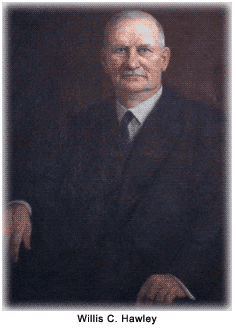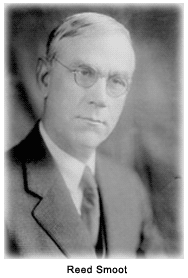The Republicans' domination of Congress throughout the 1920s afforded them ample opportunity to enact legislation that was acceptable to the business and financial communities. Action had been taken on the tariff in 1922 by the Harding administration (see Fordney-McCumber Tariff), but special interests were clamoring for a new law when Herbert Hoover took office.
 Willis C. Hawley, the House Ways and Means Committee chairman from Oregon, helped to fashion a moderate revision of the existing law. However, lobbyists went to work and successfully argued for a host of changes and exceptions, which effectively changed the bill from a modest reform measure into an extremely protectionist one.
Senate consideration was led by Reed Smoot, the Finance Committee chairman from Utah, who succeeded in deleting some of the most egregious protectionist features, but still produced a bill warmly greeted by American manufacturers and farmers. Debate was intense and passage was assured only after two Democrats came on board after receiving protection for their constituents' textile and sugar interests.
Willis C. Hawley, the House Ways and Means Committee chairman from Oregon, helped to fashion a moderate revision of the existing law. However, lobbyists went to work and successfully argued for a host of changes and exceptions, which effectively changed the bill from a modest reform measure into an extremely protectionist one.
Senate consideration was led by Reed Smoot, the Finance Committee chairman from Utah, who succeeded in deleting some of the most egregious protectionist features, but still produced a bill warmly greeted by American manufacturers and farmers. Debate was intense and passage was assured only after two Democrats came on board after receiving protection for their constituents' textile and sugar interests.
 Hoover had advocated moderate tariff revision and was disappointed by the Smoot-Hawley bill. Opponents of the measure organized a petition signed by 1,000 economists who expressed concern about anticipated tariff reprisals from other nations. Hoover ignored this advice and signed the bill into law in June 1930. The resulting tariff was sometimes called "Hawley-Smoot" but more often "Smoot-Hawley."
The Smoot-Hawley Tariff established some of the highest rates in American history, raising, for example, average agricultural rates from 38 percent under Fordney to 49 percent.
Special protection given to U.S sugar producers apparently played a role in deepening an existing economic crisis in Cuba, where low prices had plagued the industry for years. The imposition of Smoot-Hawley rates made it almost impossible for Cuban sugar to sell in America, prompting further economic turmoil and weakening the Cuban government's grasp on power.
Many historians also have maintained that the high U.S. rates under Smoot-Hawley exerted a dramatic impact on Europe as well. Manufacturers on the continent found it difficult to market their goods in America, which contributed to the former allies' increased difficulty with meeting war debt obligations, and stagnating international trade.
Hoover had advocated moderate tariff revision and was disappointed by the Smoot-Hawley bill. Opponents of the measure organized a petition signed by 1,000 economists who expressed concern about anticipated tariff reprisals from other nations. Hoover ignored this advice and signed the bill into law in June 1930. The resulting tariff was sometimes called "Hawley-Smoot" but more often "Smoot-Hawley."
The Smoot-Hawley Tariff established some of the highest rates in American history, raising, for example, average agricultural rates from 38 percent under Fordney to 49 percent.
Special protection given to U.S sugar producers apparently played a role in deepening an existing economic crisis in Cuba, where low prices had plagued the industry for years. The imposition of Smoot-Hawley rates made it almost impossible for Cuban sugar to sell in America, prompting further economic turmoil and weakening the Cuban government's grasp on power.
Many historians also have maintained that the high U.S. rates under Smoot-Hawley exerted a dramatic impact on Europe as well. Manufacturers on the continent found it difficult to market their goods in America, which contributed to the former allies' increased difficulty with meeting war debt obligations, and stagnating international trade.